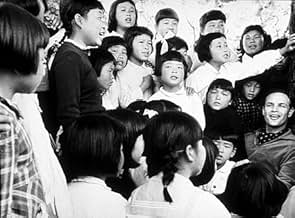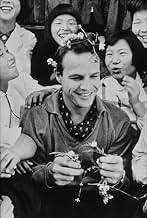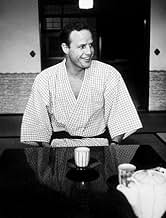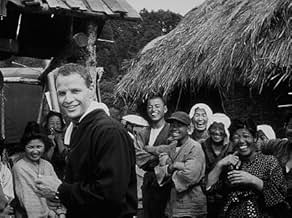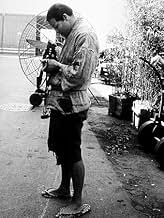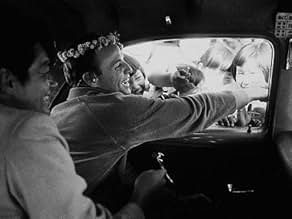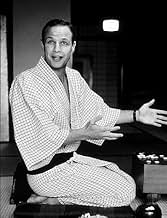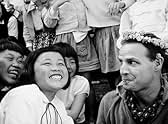IMDb RATING
6.6/10
3.9K
YOUR RATING
In post-WWII Japan, an American captain is brought in to help build a school, but the locals want a teahouse instead.In post-WWII Japan, an American captain is brought in to help build a school, but the locals want a teahouse instead.In post-WWII Japan, an American captain is brought in to help build a school, but the locals want a teahouse instead.
- Awards
- 1 win & 9 nominations total
Machiko Kyô
- Lotus Blossom
- (as Machiko Kyo)
Harry Morgan
- Sgt. Gregovich
- (as Henry {Harry} Morgan)
Carlo Fiore
- Soldier
- (uncredited)
John Grayson
- Soldier
- (uncredited)
Harry Harvey Jr.
- Soldier
- (uncredited)
Miyoshi Jingu
- Old Woman on Jeep
- (uncredited)
Roger McGee
- Soldier
- (uncredited)
Dansho Miyazaki
- Sumata's Father
- (uncredited)
Minoru Nishida
- Mr. Sumata
- (uncredited)
Aya Oyama
- Daughter on Jeep
- (uncredited)
Featured reviews
Casting Marlon Brando in this film as Sakini, a Japanese interpreter for American troops in post WW-II Japan is considered by many critics and film historians alike as one of the worst casting errors ever made in a film history. In my opinion, though, Marlon Brando is the one responsible for turning this quite an average film into a hillarious comedy. Yes, they really did it. With a little bit of make up and great effort from actor's part to learn Japanese mannerism and language in order to get an accent in his speech we have here Marlon Brando in his most unimaginable role. The rest of the cast is also quite good, namely Paul Ford as Colonel Waiwright Purdy III, a somehow cliche figure of stubborn, narrow minded US military officer and Glenn Ford by his side as Captain Fisby, for whom Brando's character Sakini ends up working as an interpreter and, of cause, unforgettable Machiko Kyo, as a spirited geisha, whom lovers of Japanese cinema must remember from Akira Kurosawa's films.
Directed by Daniel Mann (Butterfield 8, Come Back, Little Sheba) and based on John Patrick's stage play that was a big hit on Broadway at it's time, The Teahouse of the August Moon is slow in parts and in terms of some aspects of the story considerably aged and outdated but still funny and entertaining movie. 8/10
Directed by Daniel Mann (Butterfield 8, Come Back, Little Sheba) and based on John Patrick's stage play that was a big hit on Broadway at it's time, The Teahouse of the August Moon is slow in parts and in terms of some aspects of the story considerably aged and outdated but still funny and entertaining movie. 8/10
If you're not a fan of Glenn Ford's westerns, and you think he's merely an ordinary everyman, check out his timed perfection in The Teahouse of the August Moon. With such great talent, it's a wonder Jack Lemmon rose to stardom so quickly. Glenn has all the hesitation, stammering, exasperation, and desire to fix that it takes to be a comic genius. If the first time around, you don't catch all his jokes, don't worry. You were just laughing so hard, you couldn't keep up with the fast pace.
Every time I watch this delightful gem, I laugh myself sick. It does have a long running time, but it certainly goes by quickly. Glenn Ford's character is stationed in Okinawa after WWII, to oversee reconstruction and the wellbeing of the Japanese people. But in his mission to spread democracy, he's completely clueless in his new environment. Marlon Brando plays the scene-stealing Sakini, a Japanese interpreter who winks at and nudges the audience when he wants to make an inside joke. But even with an interpreter, Glenn still finds himself getting into one misunderstanding after another.
While it's seen as "white washing" by today's standards, Marlon Brando didn't intend for his performance to be offensive. In fact, he lived in a nearby Japanese village for four months to absorb the mannerisms, accent, and mentality of the local people. I found his portrayal of the savvy interpreter to be flawless; not only that, but I couldn't find any trace of his usual expressions or gestures. He completely transformed himself.
The story is heartwarming, funny, smart, and bittersweet. From Eddie Albert's obsession with soil and worms to Machiko Kyo's touching tea ceremony, this 1956 comedy is a one-of-a-kind gem with countless delightful moments.
Every time I watch this delightful gem, I laugh myself sick. It does have a long running time, but it certainly goes by quickly. Glenn Ford's character is stationed in Okinawa after WWII, to oversee reconstruction and the wellbeing of the Japanese people. But in his mission to spread democracy, he's completely clueless in his new environment. Marlon Brando plays the scene-stealing Sakini, a Japanese interpreter who winks at and nudges the audience when he wants to make an inside joke. But even with an interpreter, Glenn still finds himself getting into one misunderstanding after another.
While it's seen as "white washing" by today's standards, Marlon Brando didn't intend for his performance to be offensive. In fact, he lived in a nearby Japanese village for four months to absorb the mannerisms, accent, and mentality of the local people. I found his portrayal of the savvy interpreter to be flawless; not only that, but I couldn't find any trace of his usual expressions or gestures. He completely transformed himself.
The story is heartwarming, funny, smart, and bittersweet. From Eddie Albert's obsession with soil and worms to Machiko Kyo's touching tea ceremony, this 1956 comedy is a one-of-a-kind gem with countless delightful moments.
Marlon Brando stars as a Japanese interpreter and Glenn Ford plays a captain who has been in almost every branch in the military. Ford is ordered to go to a Japanese village to teach the people about democracy and to build a schoolhouse in the shape of the pentagon. The Japanese are only interested in building a teahouse and their isn't enough money to build both. The Japanese try to sell some homemade stuff but it won't sell until Ford finds out that they also make brandy. The military can't get enough brandy, so they build a teahouse instead of a schoolhouse. The military don't like what Ford is doing so they send a psychiatrist but he ends up helping them out instead. I thought Glenn Ford was great here and Brando also did a good job.
This movie was the first chance to see Marlon Brando in a truly comical role, not the "He Man"-unbelievably good! His accent, his body movements, the Japanese he spoke, hard to believe this was the same man who did the Waterfront.I really think he deserved an award for this role. These were a couple of the most enjoyable hours I've ever spent. Having lived in Okinawa, and familiar with the practical, down-to-earth people there, I enjoyed the movie that makes so much fun and caricatures narrow-mindedness and pompousness while exalting creativity, adaptation, and "what really matters". The movie does make fun of the narrow-mindedness of some Americans, and shows the Okinawans with respect and tenderness, as assertive, business-minded, resilient, and proud. A real quality movie, and I'm so glad I taped it from Turner Classic movies.10 out of 10.
For a guy who had some heavy duty roles,Waterfront,Sreetcar etc. this role was a real challenge for Brando and he is fabulous and steals movie although Glenn Ford is great too. This shows Brando's brilliance as an actor not that there was ever any doubt but this early in his career to take this comedic challenge shows his versatility. Is Glenn Ford ever bad? I don't think he gets the credit for all his talent. This movie probably could not be made today a victim of PC. Must have Asian play Asian and don't offend the the Japanese although the only people made to look like fool were the Americans which is fine with me because it's a comedy and people are suppose to look foolish. Never on, but caught on TCM.
Did you know
- TriviaProduction began with Louis Calhern playing Col. Purdy, but Calhern died after more than a month of filming. Paul Ford was quickly recruited, as he had created the role on Broadway, and this resulted a revived career for the lovable, irascible character actor.
- GoofsWhile Fisby and Sakini are finishing up their first address to the villagers Sakini asks Fisby what time it is. He responds that it's a quarter to 5:00. But the sun is directly over their heads as if it were noon.
- ConnectionsFeatured in Okinawa: Keystone of the Pacific (1973)
- SoundtracksSakura Sakura (Cherry Blossoms)
(uncredited)
Written and Arranged by Kikuko Kanai
Sung by Lotus Blossom
Details
- Release date
- Country of origin
- Languages
- Also known as
- The Teahouse of the August Moon
- Filming locations
- Production company
- See more company credits at IMDbPro
Box office
- Budget
- $3,926,000 (estimated)
- Runtime2 hours 3 minutes
- Sound mix
Contribute to this page
Suggest an edit or add missing content

Top Gap
By what name was La petite maison de thé (1956) officially released in India in English?
Answer

